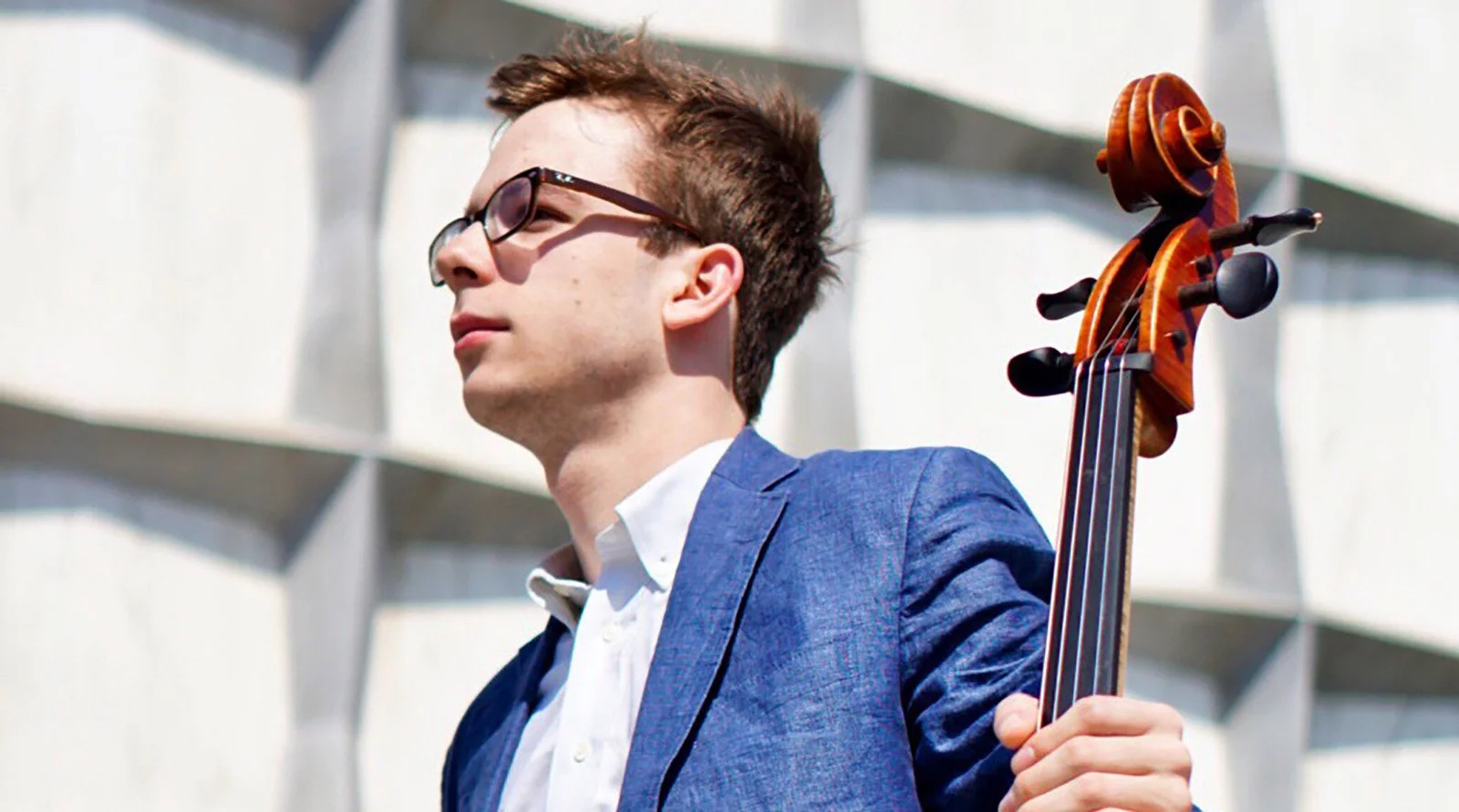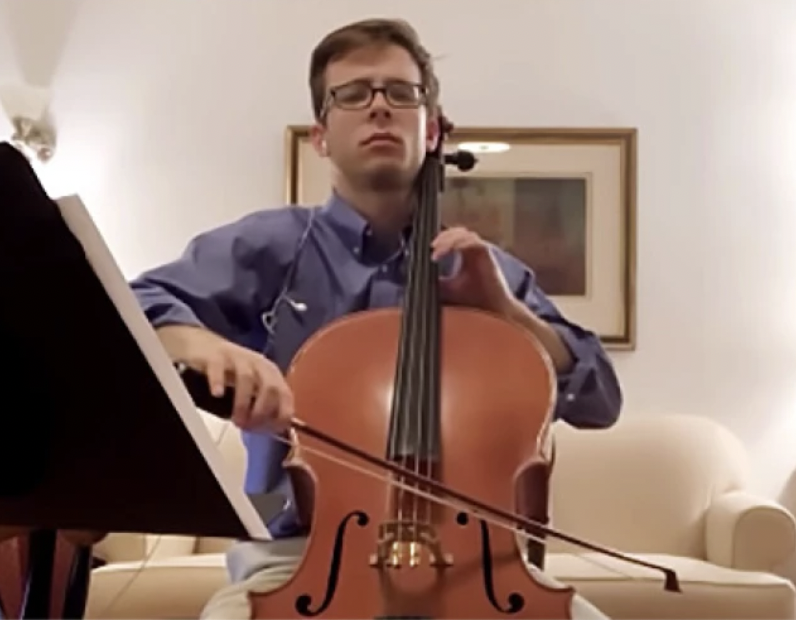From symphony orchestra to chamber ensembles to prison outreach, cellist Henry Shapard finds meaning as a musician
The youngest VSO member is about to make his Vetta Chamber Music debut with a Benjamin Britten solo
Henry Shapard.
Vetta Chamber Music presents Wartime Masterpieces on April 28 at 2 pm at West Point Grey United Church; April 29 at 7:30 pm at West Vancouver United Church; April 30 at 2 pm at Pyatt Hall; and May 1 at 7:30 pm at ArtSpring on Salt Spring Island
AS THE YOUNGEST member of Vancouver Symphony Orchestra and the youngest principal cellist of any major orchestra, Henry Shapard is living a dream—and yet the position is only one part of how he defines his role as a professional musician. So is outreach, including playing in prisons. About to make his debut with Vancouver’s Vetta Chamber Music, the 24-year-old artist has done casual cello sessions at institutions for incarcerated adults and youth in his home state of Ohio, the experiences proving deeply meaningful to him.
In a Zoom interview with Stir, Shapard explains that the impetus to perform in jails stems from the fact that he considers himself to have one foot in and one foot out of the music world; he studied history at Yale and all of the friends he went to university with are in other disciplines. This got him thinking about the role of a musician in society.
“I’ve come to think that there is a stewardship component of that that is not done justice by simply only playing for paying audiences,” Shapard says. “I started about eight months ago playing in prisons. The arts are not a significant part of things there, and I feel very strongly that this is not something that I do for fun, but it’s actually a significant responsibility of being fortunate enough to work as a professional musician and a professional artist. And this is part of the job.
“I've found the amount of them who said ‘I wanted to play an instrument, but my school's music program was cut’ or ‘I wanted to play an instrument, but my family could not afford lessons’ has made me think a lot about barriers to entry to the arts and how, you know, there’s plenty of money available for incarceration, but very little money available for the arts. And I am surprised by the amount of personal stories people have told me about how they felt if they had had music be a part of their life—not even just at difficult times but before that, growing up—that they could have been set on a different path. And that has made a strong impression on me. That’s why I go to work or go to play for incarcerated people because everybody deserves to have the arts be a part of their life.
“Chamber music, solo playing, orchestra playing, and then also this outreach: These are all necessary ways to be a working professional musician,” Shapard says.
Henry Shapard.
When Shapard performs with Vetta Chamber Music for the first time, he will be playing two pieces with Jane Hayes on piano and Vetta artistic director Joan Blackman on violin: Trio No. 2 in E minor, Opus 67 by Dmitri Shostakovich and Maurice Ravel’s Piano Trio. He will also perform Benjamin Britten’s Suite No. 1 for Solo Cello, Opus 72. The solo format is a marked departure for him.
“It’s very unusual to hear me play just on my own,” Shapard says. “I've played concertos with orchestras, where of course the cello has the solo line, and tons of chamber music, but there's only one other occasion I can think of where it has been just me sitting on a stage. And that was during my first year at university.
“I actively avoid it most of the time,” he says. “For me, orchestra playing is the peak of what I get to do, and that might be a slightly unusual answer, because I think that when people learn instruments, especially string instruments, there’s an amazing solo repertoire. But for me, and I think I have my teachers to thank for this, the idea was always you prepare so that you can be a better colleague for the people who play around you and with you. I think often when I play solo pieces I actually feel kind of lonely, really, and I prefer to have my sound with others. I’m also young enough that I feel I should still be challenging myself to do things that I’m uncomfortable with.”
And what a wonderfully mighty challenge Britten’s Suite No. 1 for Solo Cello, Opus 72 is. Written in late 1964, it’s one of three suites for solo cello that Britten composed for Mstislav Rostropovich, one of the greatest cellists of all time, who premiered the work at the Aldeburgh Festival the following year. With an intense range of emotions, the work is formidably technical.
“Learning this piece, you feel that you are staring up at the greats in a way,” Shapard says. “The whole experience of being around Britten and Rostropovich, it can make you feel full of admiration. You learn so much from it. I picked Britten to learn, because he is not a composer that I naturally gravitate towards. He’s somebody who tends to be a slow burn for a lot of people, because his tonal language is, I think, in layman’s terms, kind of odd. There are things about it that may sound sort of vaguely unnerving. Britten had a very active mind. He was also a mid-20th century composer, and he witnessed so much and his music is so distinct.
“It’s not atonal music; it just has a way of making you feel a little unsettled,” he adds. “It's not harsh. It's not grating. It's extremely beautiful, but it can feel slightly off in the same way that a nightmare where nothing happens feels.”
As he has probed the musical depths of Britten’s imagination, Shapard has found himself loving the task at hand, if daunting.
“He gets amazing sound out of the cello, and of course he held the advantage of writing it for Rostropovich, who could do anything,” Shapard says. “The colour that is available to the musician… It's astounding. The cello will sound like it's whistling at times and singing, then it’s clicking. It's like an extremely complex, abstract work of art. It would be a massive painting on the wall at the Museum of Modern Art in New York, where you would stand and just enjoy it, looking at all of the colour and texture and constantly be seeing new things….The more I look at it, the more I see.”
Shapard, who served as principal cello and assistant conductor of the Yale Symphony Orchestra, is a two-time fellow of the Tanglewood Music Center of the Boston Symphony Orchestra who has also performed across Germany and Denmark as a member of the Schleswig-Holstein Festival Orchestra. He says he was keen on joining Vetta for its season-closing concert and in taking on one of Britten’s masterworks as an admirer of the chamber-music organization. What the three composers on the program (Britten, Ravel, and Shostakovich) share in common is they were all impacted by the world wars in the first half of the 20th century. They wrote their music in spite of, and because of, the strife surrounding them, explains Blackman.
“As the war broke out in Ukraine, I was thinking about the 2022-23 Vetta season,” Blackman tells Stir. “I was also feeling the horror of war. Originally, I wanted this program to begin the season. It would explore how war can motivate composers to write great works of art even though it causes great suffering. The last program was supposed to be about peaceful inspiration, other works of art inspiring composers, to create an evolution from war and strife to peace and resolution in the season programming.
“Artist availability dictated a reversal in the order, and here we are in the spring, the war still raging,” she says. “So we will dedicate this program to the resilience of humanity, the ability to make something beautiful and worthwhile out of humanity’s greatest flaw.”
Shapard echoes the sentiment.
“In all three pieces on this program, you can really hear the style of the composer,” he says. “They convey such a wide array of emotions that are associated with the composers. There's so much to love on the program and to reflect on.














